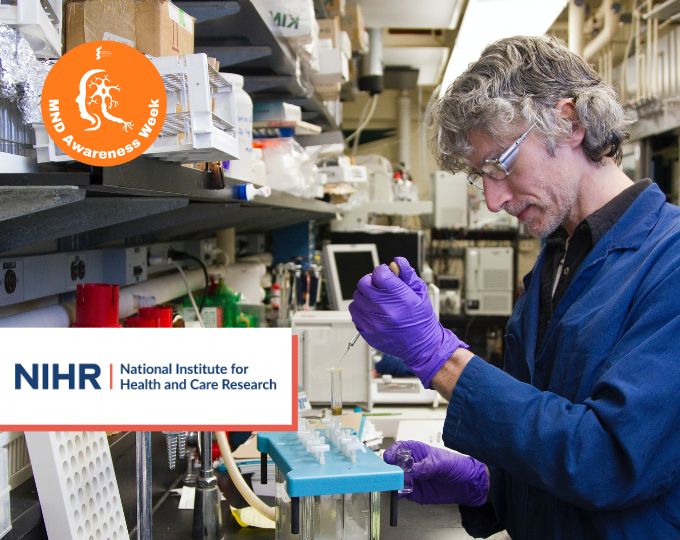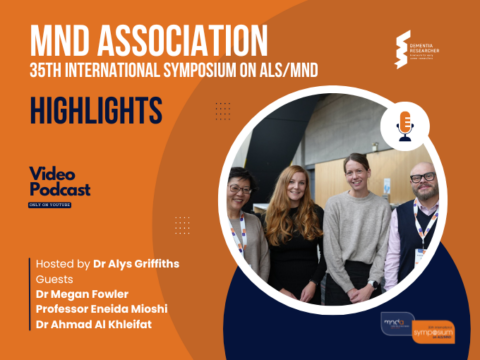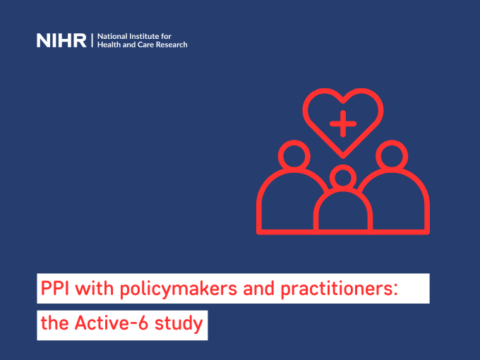
NIHR is announcing its next major step in new government action to speed up research into Motor Neurone Disease (MND). This is part of a £50 million commitment to MND research over five years – by the Department of Health and Social Care (DHSC) and the Department for Science, Innovation and Technology (DSIT).
Subject to contracts being signed, NIHR will be investing almost £8 million into early phase clinical research for MND. This will seek to speed up innovative new treatments for patients. This programme of early phase clinical research, led by the NIHR Biomedical Research Centres (BRCs), is made up of a £4.7 million investment in a collaboration of UK researchers who will take forward an early phase platform trial to screen for drugs which have the potential to be successful in clinical trials. It also includes a further £3.25 million investment to train a new group of MND researchers to support future research. Researchers hope eligible patients can begin taking part in the study in summer 2024.
This NIHR funding will support the project for 3.5 years. Patient charities MND Association, My Name’5 Doddie Foundation, MND Scotland, and medical research charity LifeArc intend to provide additional support to extend the study to 5 years and carry out additional lab research.
“Motor neurone disease is debilitating. This new funding demonstrates our commitment to helping the UK’s world-leading scientists to test promising new drugs, and confirms the Government’s commitment to MND research. Our investment will also help train and support the next generation of MND scientists to tackle this complex illness. Research is the best opportunity we have of finding new insights and ways to treat MND and improve the lives of everyone impacted by the disease.” Professor Lucy Chappell, NIHR Chief Executive
Building strength in MND early phase clinical research
MND is also known as Amyotrophic Lateral Sclerosis (ALS). There is currently no effective therapy or cure for the disease. Patients face a rapidly progressing paralysis that spreads around the body. This robs them of the ability to walk, eat, talk and eventually breathe. Around half of those diagnosed with MND will die within two years. The condition affects around 330,000 people around the world.
Historically, drug trials for MND have rarely been successful. Drugs need to be tested in phase 3 clinical trials (such as the MND-SMART platform launched in 2020), to show if they will benefit patients. But phase 3 trials can be expensive and time-consuming and their success rate is variable.
A new £4.7m early phase platform programme – called ‘EXPErimental medicine Route To Success in Amyotrophic Lateral Sclerosis (EXPERTS-ALS)’ – will help this. Researchers at the Universities of Sheffield and Oxford will lead a collaboration of expert centres across the UK. They aim to recruit 700 people with MND from 11 centres for the five-year trial. The EXPERTS-ALS programme will screen potential drugs, looking for early signs of benefit found in blood tests. A ‘go’ or ‘no-go’ decision can be reached within a few months. Successful drugs can be prioritised for testing in the larger phase 3 trials , with a higher chance of a positive outcome.
All study participants will be asked to provide additional biological samples to enable researchers to create a valuable bank of samples. This will allow scientists around the UK to learn from every patient involved in the trial to uncover new insights into MND and possibly identify new research approaches.
“MND is a cruel and devastating disease and we need new approaches to identify more effective treatments to help patients. EXPERTS-ALS is a pioneering project to prioritise the drugs which have the best chance of success in halting the progression of this terrible degenerative disease. Over five years, we will be able to screen drugs faster, on a larger scale and identify which ones should proceed into phase 3 trials based on signals found in people living with MND.” Professor Christopher McDermott, UK MND Research Institute
Funding for the future
EXPERTS-ALS brings together a collaboration of 11 organisations. This includes a range of NIHR BRCs in England and additional institutions from across the devolved administrations.
The £3.25 million of the £8 million investment will be used to build research capacity across a range of career levels among MND researchers involved in the study. This programme of work will harness and develop skills and expertise across centres and clinical research networks and lead to an increase in capacity for experimental medicine and therapeutic trials research in MND.
The approach to capacity building has four interlinked components:
- Early career cohort
- Trial infrastructure and capacity
- Experimental medicine infrastructure
- Collaboration
This is the first time a broad collaboration of NIHR BRC and UK Dementia Research Institute partners and other centres of excellence has come together to focus on patient-based MND research.
The 11 universities involved in the collaboration are:
- University of Sheffield
- University of Manchester
- University of Edinburgh
- University of Newcastle
- University of Exeter
- South Wales MND Network and University of Cardiff
- The Walton Centre, University of Liverpool
- King’s College London
- University College London Queen Square Institute of Neurology
- University of Cambridge
- University of Oxford
The NHS trusts involved are:
- King’s College Hospital NHS Foundation Trust
- The Newcastle Upon Tyne Hospitals NHS Foundation Trust
- Cambridge University Hospitals NHS Foundation Trust
- Sheffield Teaching Hospitals NHS Foundation Trust (sponsor of the study)
NIHR has published a joint NIHR/Medical Research Council Highlight Notice inviting outstanding researchers across the academic and life sciences sector to submit applications to an open call for the highest quality projects. Read more about the Highlight Notice and instructions on how to apply.

 Print This Post
Print This Post





